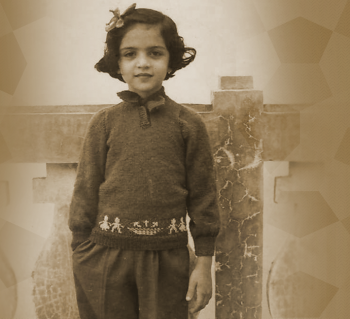 This is a photo of me, age 5, taken on a trip to Mussoorie — which, at that time, was a remote holiday resort in the foothills of the Himalayas in the far North of India.
This is a photo of me, age 5, taken on a trip to Mussoorie — which, at that time, was a remote holiday resort in the foothills of the Himalayas in the far North of India.
It was the first of a handful of summer vacations that my dad and I took together, just the two of us, before our family’s life descended a trail that eventually brought me to North America.
On this trip, we had stopped in Delhi first, to visit my mother. I remember little of our time in Delhi. A meal at the home of friends with whom my mom was living. The echoing vastness of a house different from our own. My dad packing our brown leather suitcase for an early morning start for the long journey to Mussoorie.
Then, a black Vauxhall car, the spicy scent of my dad’s pipe tobacco, an exhilarating bus ride up steeply winding, perilously narrow mountain roads, along hairpin switchbacks, the bus swaying so close to the edge that dirt and rocks tumbled down the mountainside as we wheezed past.
The bus dropped us off at the outskirts of town. From here on in, the only traffic was pedestrian. A cluster of hand-pulled rickshaws quickly surrounded us, the rickshaw-pullers calling out in hoarse voices, vying for our attention and our custom. My dad negotiated a price with one of them, and began to load our single suitcase into the rickshaw.
The man’s naked back, nut-brown, gleamed with sweat. His eyes were cloudy pools under straggly brows peppered with white. His bare feet were chalky with dust, the skin fissured all around the edges. Knobby knees under a frayed dhoti.
I remember all of this, vividly. And I remember the feeling — a stone in my stomach, a blaze in my throat. Sorrow, outrage, stubborn refusal.
I would not sit in that rickshaw.
I would not ride while a man used his body, his frail, narrow body, to pull me where I wanted to go. “He’s a human being!” I protested. “There’s two of us and one of him. He should sit in the rickshaw and we should pull him up the hill!”
My dad nodded in understanding, and took the suitcase back down from the rickshaw. We began to walk. The rickshaw-wallah walked beside us, urging my dad to get in, get in – offering to lower his rate; pleading. My dad shrugged and shook his head, “It’s no good. She won’t do it.”
What I didn’t understand, then, was what my father tried to explain to me as we trudged up that hill with the rickshaw squeaking beside us: This is how the rickshaw-puller earned his living. If we didn’t ride in his rickshaw, his family would go hungry that night. “Then give him the money!” I cried, with a child’s logic, a child’s naive certainty. “We don’t have to ride in his rickshaw for you to give him the money to feed his family!”
My dad, being the man that he was, opened his wallet and gave the rickshaw-wallah the fare for a ride we would not, could not take. He did it ceremonially, acknowledging the brotherhood that linked us together on that road, using the formal Urdu pronoun that conveys respect, and with a humble bow to the dignity of the man who walked beside us.
That day, we didn’t solve any of India’s Big, Intractable Problems — poverty, hunger, injustice, inequity, class and caste-based violence, and so many more. But that day set me on a path that made me who I am today.
It was one of my earliest experiences of something I knew, viscerally, but couldn’t articulate except as outrage and refusal to accept that this was just the way things were. It was one of several, very early experiences of voicing my feelings and my desire, and effecting change in a situation that I didn’t fully understand, but felt compelled to change in whatever way I could.
It was an experience that shaped many of the choices I’ve made in my life.
We are born sovereign. And we are born knowing the truth of sovereignty — that every other being is sovereign, too; that our own sovereignty calls us to act decisively on behalf of our fellow beings, because our sovereignty is bound up in theirs. What we honor in them, we honor in ourselves. What we fail to protect in them, we offer up to the great vultures of greed and emptiness that feed on our own humanity.
Today, more than sixty years later, my understanding of sovereignty is more nuanced, more finely shaded through the trials of experience and the gifts of earned wisdom. It embraces each side of the complex equations we calculate every day as we grapple with the pain and injustice of the world, and with our own needs and desires. And it includes both admiration and compassion for our fumbling attempts to resolve, through our choices and actions, the paradoxes we face as we learn, over and over, how to be in sovereign relationship with life.
Sovereignty is a gift, one which carries with it the responsibility to nurture and cherish all life — simply because we are interdependent beings, held in a web of intimate connection.
We each offer our gifts in our own way, to serve and benefit the whole. How we do this will change and evolve as we move through the seasons of our lives. But the journey to sovereignty begins with understanding and nurturing our own sovereignty, honoring our personhood, and cultivating wholeness in our inner kingdom first.
We give what we are. On a practical, everyday level, it’s pretty simple. Boundaries help us be more fully ourselves. When I am myself, I’m able to share myself — the gifts of soul, the gift of my personhood — with my world. I can be loving, kind, funny, playful, generous. My presence blesses me and my world.
When I lose myself — either by merging with someone or something else, or losing my sovereignty in some other way, by allowing that which is not-me to become stronger in my energetic space than my own soul — I become a blobby mess, unable to connect with my soul, and unavailable for true communion with anyone else.
For me, there’s a rhythm of engagement and solitude that helps me stay whole and present. Too much engagement and I fray around the edges. Too much solitude and I lose connection with my heart. So it’s a dance rather than a fixed state of being. Maintaining sovereignty requires skills, willingness, self-awareness, and daily practice.

